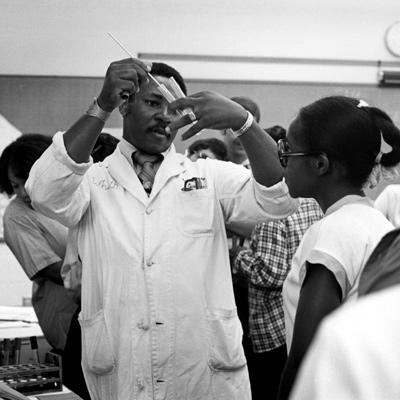Vital Signs » Winter 2018

Coming up on its 40th year, the Horizons in Medicine program has given more than 600 high school students in the Dayton area the opportunity to prepare for careers in science and health care. It has sparked the passions of numerous students who are doctors today, many of whom were educated at the Boonshoft School of Medicine. Those participating in the program gain shadowing experience and are eligible for a one-year, full-tuition scholarship to Wright State University. Most of the students who attend the program are underrepresented minorities or from disadvantaged backgrounds. Alumni doctors credit the program with helping them to see that a career in medicine was possible. For some, it started their passion for medicine. For others, it filled in the gaps, strengthening a long-held desire to become doctors.
“I was one of those people who knew very early that I wanted to be a doctor. But I think that the Horizons in Medicine program really solidified it,” said Alisahah Cole, M.D., ’04, vice president and system medical director of community health at Carolinas HealthCare System. “I think it really was the catalyst or the impetus for me to say, ‘You know what, I actually, really can do it.’”
One of her fondest memories of the program was when the class dissected a cadaver in the human anatomy lab. As a high school student from Trotwood, Ohio, it was her first experience seeing a donated human body. The experience affirmed her desire to pursue medicine as a career. Students in the five-week program also get to experience instruction in medical school classrooms from current students, shadow physicians in Dayton-area hospitals, and complete a research project.
“We had a project that we were responsible for, focusing on hypertension in the African-American community. I remember it emphasized that whole notion of team-based learning. At the end, we presented our findings in a larger setting,” Cole said. “It also taught us public speaking and how to discuss the research and even some tips around how not to be nervous. That was really good to learn as a high school student.”
The program does a good job of introducing students to the concept of working in teams and how that applies to health care, she said. Cole also enjoyed interacting with practicing physicians, and getting to see how they went about their jobs on a day-to-day basis. She heard talks from several medical doctors, including Gideon Adegbile, M.D., clinical professor of family medicine at the Boonshoft School of Medicine. He has served as co-chair of the program since 1979.
“He was very inspirational,” Cole said.
“It was just good for me, being a young African-American student, seeing physicians of color.”
Adegbile is passionate about the program, as he has seen its impact over the years. Eighty percent of students who complete the program go on to complete college. “We want to encourage minorities to attend medical school,” Adegbile said. “We are very proud of the program. Every dean has supported the program wholeheartedly.”
In part because of her experience in Horizons in Medicine, Cole chose to attend Wright State for medical school after completing her undergraduate degree at Case Western Reserve University. She also appreciated how connected the Boonshoft School of Medicine is with the surrounding community. The summer after her first year of medical school, Cole was able to relive her Horizons experience by volunteering as a teacher.
“I was able to help mentor and teach classes to the high school students. That was kind of a full-circle moment for me to be able to give back to a program that has influenced my life so much,” Cole said. “Again that moment in the gross anatomy lab, I loved being able to see those who their eyes lit up and they were really excited. I always say you kind of love it or you hate it. And you can always tell which group people fall into.”
Now established in her career, community service and giving back is still important to Cole. Her position with Carolinas HealthCare System is a great example.
“My responsibility is to develop and implement a system-wide strategy of community health and benefit to improve the health of the communities we serve,” Cole said.
- Daniel Kelly

